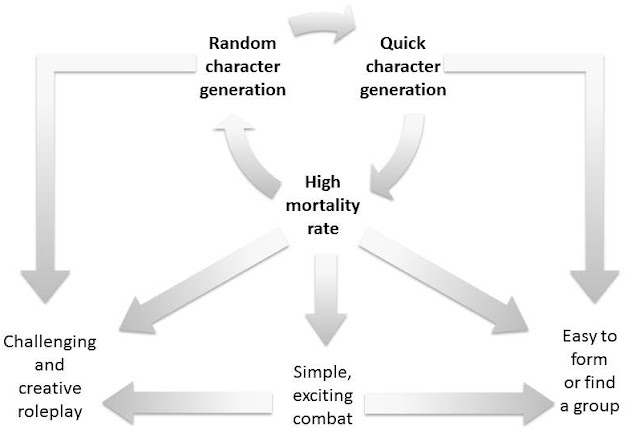After explaining the
relationship between a game’s mortality rate and its method of character creation, how the former leads to simple and exciting combat, and
why all of this makes it easy to form or find a gaming group, I finally get
to analyze how it all relates to challenging
and creative roleplay.
Random character generation results in quirky characters (an intelligent warrior,
a nimble wizard etc.) and, perhaps more importantly, in characters one might
not have chosen to play otherwise.
A high mortality rate leads to a much, much more intense roleplaying experience. Consider the following scenario:
Peasants ask the
adventurers to help them against a terrible monster. It’s a sandbox campaign,
so the monster might indeed outmatch the characters and it’s up to the players
to decide whether to tackle it or not.
If the players know that the DM will let them escape in
case things go wrong, or will adapt the monster to the party’s strength, or
fudge, then the choice to play the heroes is an easy one.
(And that’s exactly what the
players will do: play the heroes.)
If the players know
- from actual experience - that PC death is a very real possibility and a TPK is not out of the question,
then the choice to play the heroes is a tough one.
(And if the players go
through with it, they are the heroes,
at least to the extent it’s possible to vicariously experience such a thing through fiction.)
In the former case, you’re
emulating a genre and creating a story (with high drama and heroic deeds).
In the latter case,
you’re putting yourself in a character's shoes to make challenging choices and suffer the
consequences, for good or ill.
Of course, similarly
negative consequences for the players
also work to some extent. If the risk is real, the play is intense. Choosing to
enter a tomb when you know it’s full of level-draining wights takes guts on the part of the player. Choosing to
save an NPC’s life instead of escaping with gold worth 3000 XP requires
that the player is really invested in the in-game fiction or his vision of the
character.
(Risking a -1 penalty
for the next three encounters or getting those 3000 XP or whatever from the ‘story
award’ for saving the NPC – well, that’s just not the same.)
Oh, and then there’s simple combat. A simple combat system
frees up mental space for creative solutions or evocative descriptions. In
complicated games, players are so busy tracking multiple variables and weighing
(preconfigured) options that there is hardly any time to appreciate the fiction
or think outside the box. It was a running gag in one of my Rolemaster
campaigns that, after a long fight, the players and DM would enumerate all the
mechanical advantages and bonuses they had forgotten about.
That's it for now with My Trinity of Old School Gaming. Next, I'll start a series on Becoming a Killer DM, but I plan to throw in some rants and reviews as well.

A wonderful analysis. I heartily endorse it!
ReplyDeleteNicely put.
ReplyDeleteVery nice post.
ReplyDeleteThank you all for your positive feedback! It means a lot to me as a newbie blogger.
ReplyDeleteHow about some more praise, but this time from the future? I liked this miniseries. A concise and elegant way to present the fun stuff old school play can offer. I'm a beginner DM with a few sessions played, so reading stuff like this helps me know what's important during prep and play.
ReplyDelete